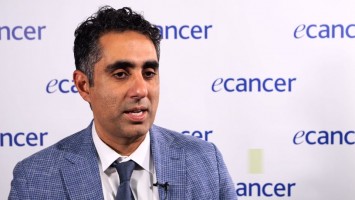This weekend I’ll be presenting on the topic of precision medicine from a nursing perspective. Basically I’ll be starting off with an overview of what is precision medicine, next generation sequencing and how it impacts our patients and the way that we treat them. Going over just a few landmark presentations on precision medicine and how it has evolved over the last few years. Lastly I’ll tie it up with what are the nursing implications for practice, so what are our responsibilities as nurses and nurse practitioners to educate ourselves, educate our patients and our colleagues; support that’s necessary from the institution, from colleagues, from other providers that we work with to really just hold ourselves accountable for educating ourselves and owning and having a role within precision medicine.
How do you operate at the University of Miami?
We have a precision medicine department at the University of Miami and it’s basically made up of three pillars. The first pillar is basically a review of different patients’ cases. So the patients will have their tumour sent off for this test, it’s called next generation sequencing, where they will be looking for genetic mutations. Once we get that report back we review it and then we give recommendations to either the providers, really looking at clinical trials within the University and, if not, within South Florida that are reasonable options for the patients. If not we look for off-label uses of drugs or other options for patients.
The second pillar is tumour board. So we have a precision medicine tumour board where really complicated patients, heavily pre-treated or really rare tumours, we really look in more detail at their case and have different experts from all the different disciplines look at it and give advice on what the best treatment would be for that patient.
Then the last component is the educational clinic for patients which is what I’m involved in. That’s either an upfront appointment with me or at the end, after having their tumour sequenced and looking for options. Upfront it’s educating the patients about what is the testing and what are the implications; pros and cons, costs, just really expectations for the patients. At the back end, once the patient has the testing done, we bring them back in and we review the results and look for options for them and refer them as appropriately.
What has the response been like from patients?
I would say the response has been favourable in terms of the clinic itself. It’s nice for the patients to have another resource and someone that’s maybe a little bit more specialised in what it is that we’re doing for them. So they still have their primary oncologist or haematologist, this is basically just another advocate for them, somebody to speak for them on behalf of what their needs or requests are, answer any questions. I follow up with them, I follow up with the companies, for example, that we send the testing to. Some of it is done internally and some of it is done externally. So I act as a liaison where I speak to the companies, I follow up with them, I’m looking at the tissue, speaking with the pathologist, trying to just really make it work as seamlessly and as quickly as possible because there is a turnaround time, so there is a lag. The patient will still see the oncologist, it’s just another person.
So I’ve had really good feedback from the patients and they appreciate having somebody that they can call and will help them. Many times the oncologists have a lot going on, many different cases that they’re working with whereas mine is a little bit more specialised with them.








